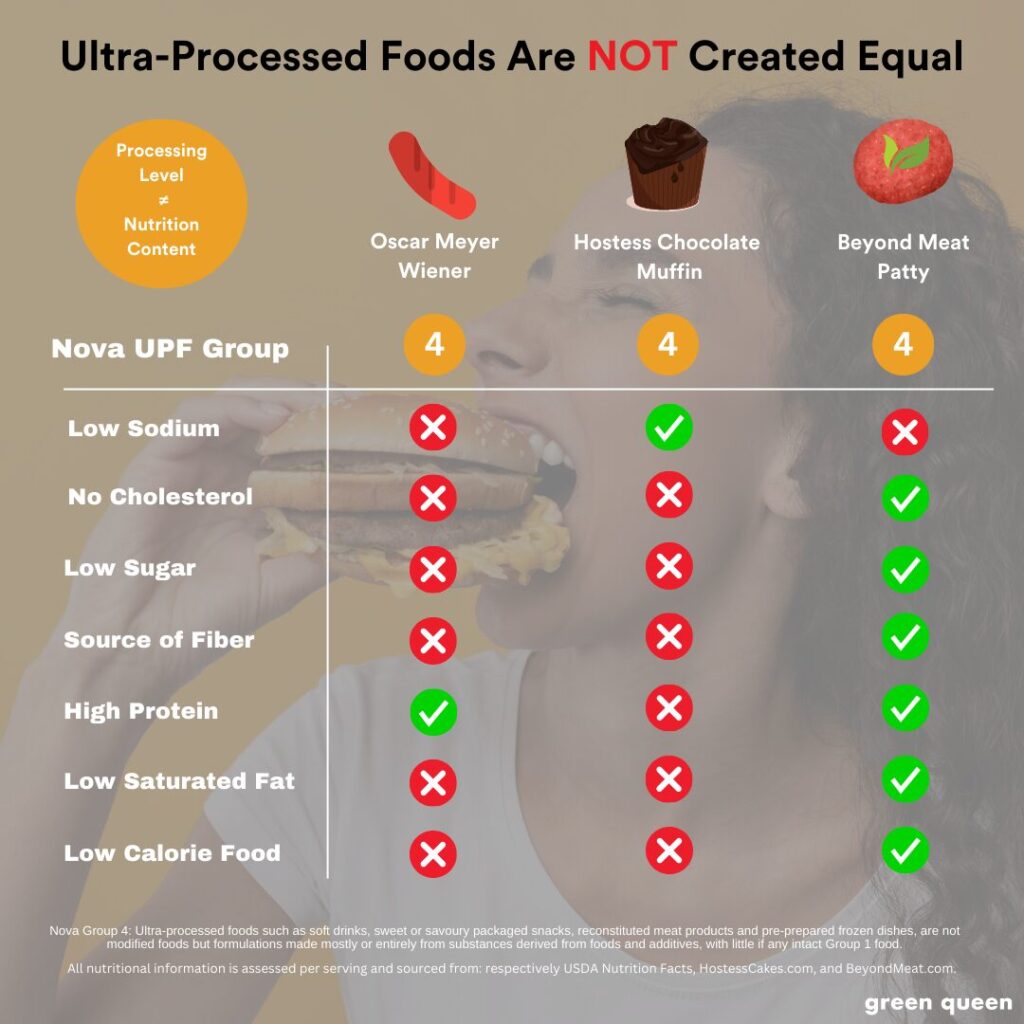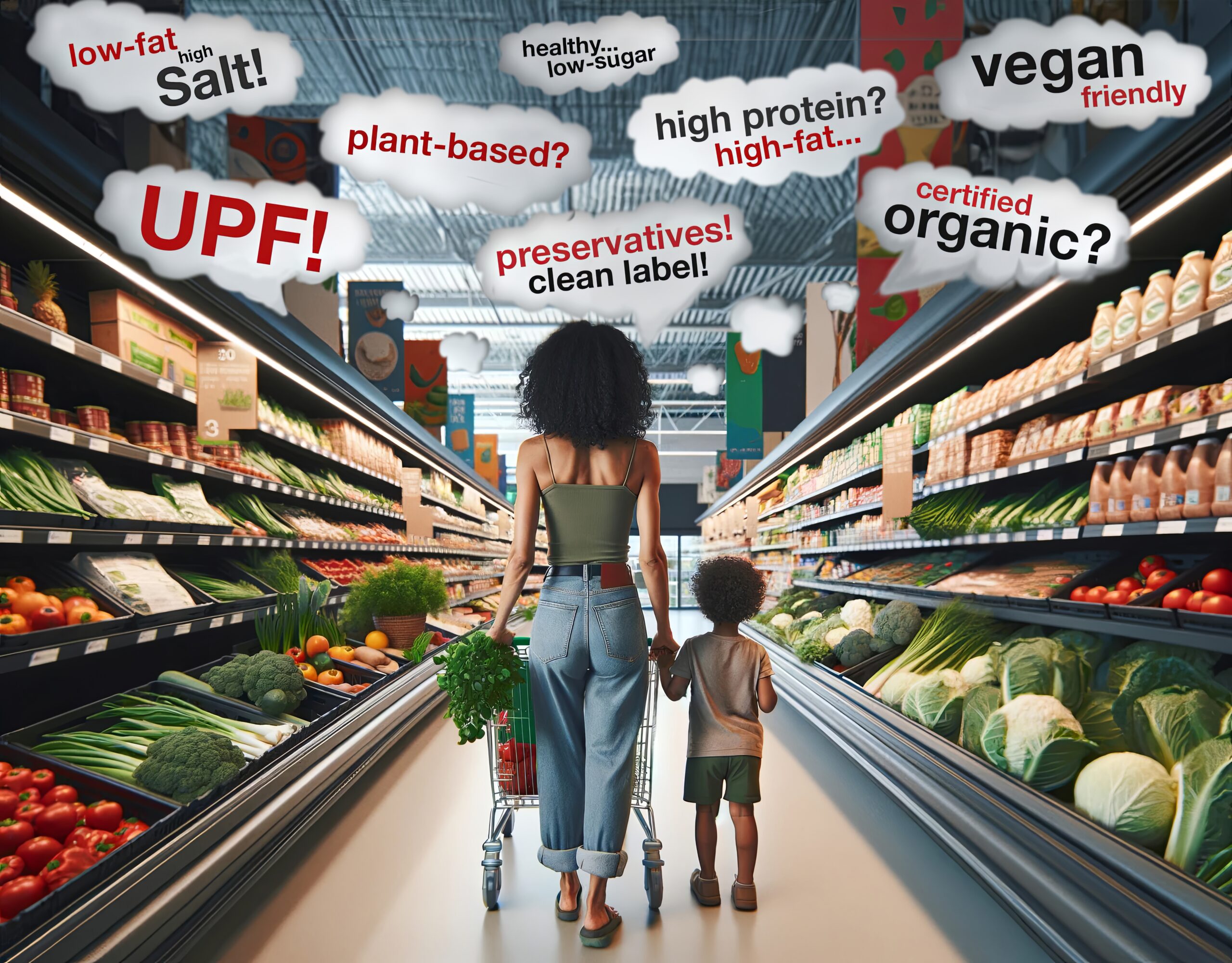Not All UPFs are Equal: Green Queen Unveils FAQ Guide for Plant-Based Meat & Ultra-Processed Foods
6 Mins Read
To combat misinformation, ease consumer confusion and offer balance to the discussion around plant-based meat and ultra-processed foods, Green Queen has published a free, comprehensive resource guide on the topic in an easy-to-use FAQ format.
Are all plant-based meats ultra-processed foods? How often should you eat vegan meat alternatives? What are the limitations of the NOVA classification? What does research get wrong about these subjects?
If you’ve ever had a similar concern about the food you eat, you’re not alone. For years, everyone has been asking questions about plant-based meat, ultra-processed foods (or UPFs), and whether the former falls into the latter category.
In a consumer landscape flooded with contradictory dietary information in the media, misinformation on social networks, and unverified claims by online influencers, it’s easy to feel overwhelmed and confused. Take this UK poll from last year, for example, where 70% of the 2,127 respondents hadn’t heard of UPFs before the survey. And while 21% said a “healthy, balanced diet” shouldn’t include UPFs, there was a lack of understanding over which foods can be classified as such.
It’s important to provide clarity on the topic. After all, UPFs make up 57% of an average Brit’s diet, and up to 80% when it comes to children or people with lower incomes. And it’s not just the UK, of course: 73% of the US food supply is made up of these foods. According to estimates, UPFs comprise 60% of an average American’s daily calories, and 70% of what the country’s children eat.
Jenny Zegler, director at Mintel Food & Drink, highlighted the public confusion in November, telling FoodNavigator: “34% of US adults say highly processed food is the top concern… there’s a need for clear communication to help consumers make informed decisions about how processed and ultra-processed food and drink fit into their diets. Processed food isn’t necessarily something we can avoid. Almost every single thing in the grocery store is processed somehow.”
One of those things that have come under increased scrutiny is plant-based meats, whose critics have knocked their ingredient lists and ‘overprocessed’ nature. But unlike most UPFs – especially the processed red meats they intend to replace – meat alternatives typically contain a high amount of dietary fibre, are free of cholesterol, and are low in saturated fat, sugar and calories.
To dispel the myths and provide a comprehensive outlook of the subject, Green Queen founding editor Sonalie Figueiras, in collaboration with researcher Marlana Malerich and scientist Alice Johnson, have published the ultimate resource for UPFs and alt-meat products. Presented in the form of FAQs, they touch upon a wide variety of questions, and provide science-backed, fact-based information to inform readers about how UPFs work, why they aren’t all the same, and how they’re connected with plant-based meats.
What are ultra-processed foods?

But wait, what are UPFs in the first place? In 2009, researchers from Brazil led by nutrition and public health professor Dr Carlos Monteiro proposed a framework to classify edibles into four subgroups, called the NOVA classification. The first group contains unprocessed or minimally processed foods, which includes fresh, frozen and dried produce, milk and plain yoghurt, natural spices, legumes, grains, nuts and seeds, as well as foodstuffs like pasta, couscous, flour, fungi, meat and fish.
The second category – “processed culinary ingredients” – comprises elements derived from the first group or from natural sources, such as seed, nut and vegetable oils, butter, salt, sugar, vinegar, maple syrup, and honey. Meanwhile, the third group contains processed foods, defined as those produced by adding these culinary ingredients to unprocessed foods or made using baking, boiling, canning or non-alcoholic fermentation, for example. These can contain non-cosmetic additives that enhance shelf life or prevent bacteria: think fresh bread and cheese, canned vegetables, fruits in syrup, cured meats, salted nuts, etc.
The final category – you guessed it – is UPFs, which constitute industrial formulations and techniques like extrusion or pre-frying, combined with cosmetic additives and often using substances of little culinary use, such as high-fructose corn syrup, hydrogenated oils or modified starch. Most ice creams, cereals, flavoured yoghurts, and – of course – plant-based meats all fall into this category. These products are omnipresent in our diets and food system but are often confused with ‘processed’ food – a category most food falls into. The flour, white rice and olive oil you cook with are all processed to some degree, but they’re not classed as UPFs.
The discourse around UPFs has amplified since British infectious diseases physician Dr Chris van Tulleken‘s book, Ultra-Processed People: The Science Behind Food That Isn’t Food, came out in April 2023. Here, he suggests that large food companies are pushing consumers towards an increasingly processed diet.
Experts have found that UPFs can raise the risk of heart disease, stroke, obesity, type 2 diabetes, breast and colorectal cancer, and hypertension. But some have pushed back against a simplistic black-and-white perspective on these foods, calling them necessary to feed the world and arguing that the lack of an agreed definition spurs confusion about what is or isn’t a UPF.
Others have noted that the NOVA system is based on the degree of processing of a certain food, but does not speak to nutrition. A study published in The Lancet last year adds further nuance: basing its findings on the dietary and disease history of 266,666 people in seven European countries, it suggested that some UPFs can be good for you.
Green Queen’s ultimate list of FAQs about ultra-processed foods

It’s in this vein that Green Queen partnered with food and climate researchers Marlana Malerich and Alice Johnson – with support from Amy Williams, digital communications manager at the Good Food Institute – to create the evidence-backed FAQ resource, allowing consumers to break down the intricacies and make informed dietary decisions, specifically around alt-meat.
“One of the most common questions we get from our Green Queen audience is about whether plant-based meats are healthy,” said Figueiras. “Expressing the nuance around plant-based meats and ultra-processed foods can be tricky, which is why we wanted to create this comprehensive FAQ guide to cover all the possible questions on the topic with answers that are balanced and backed by the scientific literature.”
The guide covers everything you need to know about the subject – from UPF definitions, limitations of and alternatives to the NOVA classification system, and nutritional profiles and ingredient composition of plant-based meats, to the origin of the UPF and alt-meat debate (including who is funding media campaigns on the topic).
“Existing research suggests that plant-based meat products have favourable health benefits, especially when used as a substitute for animal analogues,” says Malerich. “However, the nutrition content varies depending on the brand and ingredients.”
Johnson adds: “Whilst further scientific studies are needed on novel protein sources, preliminary findings suggest that choosing plant-based alternatives over conventional meat could offer benefits for a variety of reasons.”
With consumers becoming increasingly aware of the links between diet, health and the environment, understanding the true nature of UPFs and plant-based meat is paramount. Green Queen’s guide serves as an essential tool for health enthusiasts, food industry professionals, regulators and reporters alike.
Access Green Queen’s Complete Guide to Ultra-Processed Food and Plant-Based Meat.




